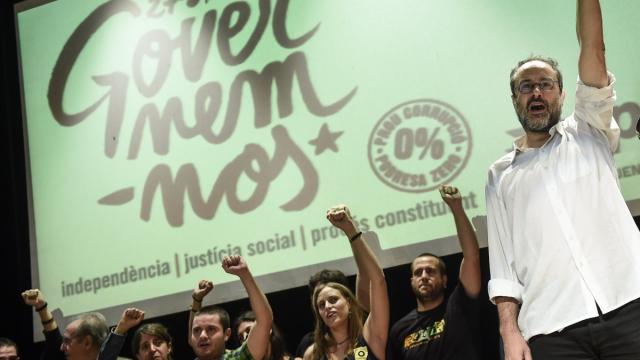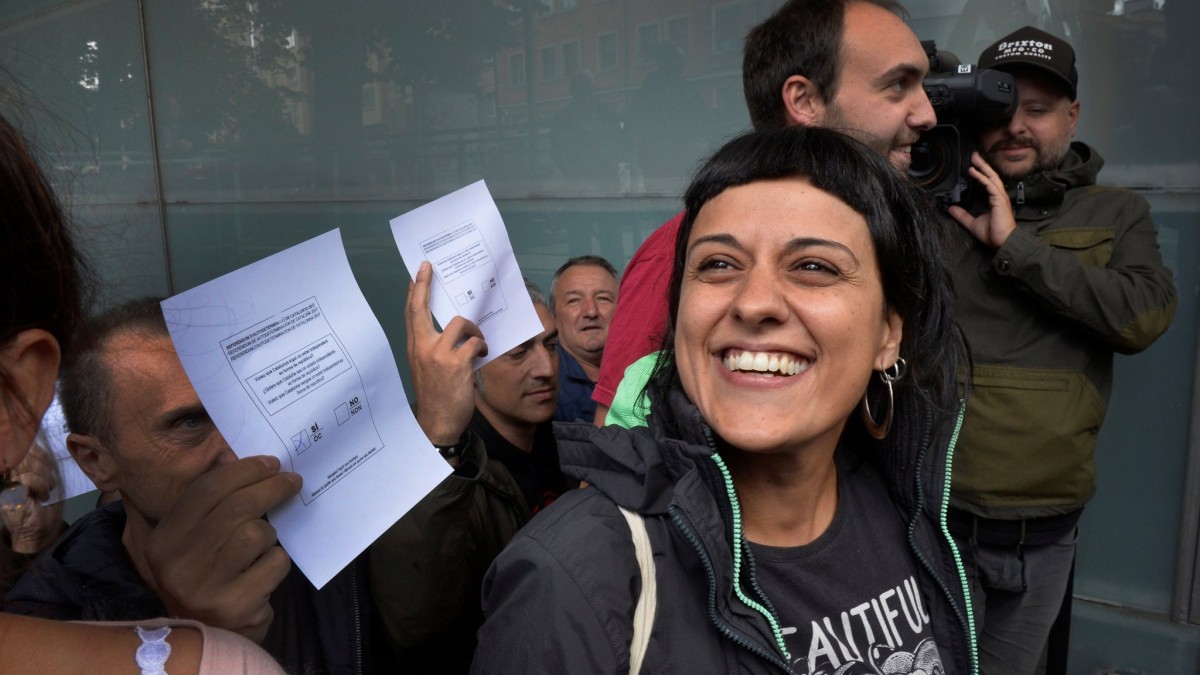
This is Part 24 in a series about Radical Municipalism looking at ways people worldwide are organizing in their cities to build power from the bottom up. Read Part 1 (Brazil), Part 2 (Rojava), Part 3 (Chiapas), Part 4 (Warsaw), Part 5 (Bologna), Part 6 (Jackson, Miss.), Part 7(Athens), Part 8 (Warsaw & New York), Part 9 (Reykjavík), Part 10 (Rosario, Argentina), Part 11 (Newham, UK), Part 12 (Valparaiso, Chile), Part 13 (Porto Alegre, Brazil), Part 14 (Montevideo, Uruguay), Part 15 (Venezuela), Part 16 (Cape Town), and Part 17 (Congo), Part 18 (Jemna, Tunisia), Part 19 (Gdansk, Poland), and Part 20 (Senegal), Part 21 (Mumbai, India), Part 22 (Vietnam) and Part 23 (Japan).
A radical municipalist wave took over cities in the Spanish state in 2015. The best known of the groups is Barcelona En Comu (examined in the next part of this series). But building bottom-up power has a longer history in Catalonia, and the muncipalist thread interwoven into the radical Catalan independence movement offers insight into how to challenge state power – a paramount concern for municipalists everywhere.
Spain's violent reaction to the 2017 Catalan referendum, and the ongoing political trials of the region's leaders, both oppose and contrast with the bottom-up independence movement. In that dramatic moment two autumns ago, an autonomous network of neighbourhood assemblies, organising through encrypted communications, peacefully outsmarted gangs of riot cops.
Spanish reactionism galvanized Catalans to claim their country, street by street, barrio by barrio. I witnessed this first hand in Girona, north of Barcelona, where the chant "Votarem" (We will vote) rallied beyond a flag. Voting was about reclaiming sovereignty, breaking the status quo. Spanish state violence prevented Catalonia from leaving in 2017, and arguably Spanish legitimacy over the region was lost forever.
The Candidatura d'Unitat Popular, or CUP party, was seminal in driving the October 2017 referendum. The party had held the balance of power in the pro-independence Catalan Parliament since 2015, and they succeeded in transmitting the growing street fervor for independence to the Parliament.
Today, this anti-capitalist, feminist and democratic party is one of the most influential leftwing parties in Europe. It seeks to build counter-power to confront the multiple crises produced by capitalism. Radical municipalism is at its core.
Municipalists for independence
The CUP formed in the late 1980s, but only vied for municipalist elections in 2012. "Many of the participants came from organizations that resisted the dictatorship, like Movimento de la Defensa de la Terra. The inheritance goes back to those who fought in the Spanish Civil War," Ona Curto Graupera, who is running as a CUP candidate in Arenys de Mar municipal elections this May, told me recently.
According to her colleague, Quim Arrufat, an MP with CUP between 2012 and 2015: “We consistently rejected the notion of building a national organization until we had accumulated some political power in the municipalities. We sought to work together on practical matters in order to see how to manage power, how to manage social movements, how to organize people on a local basis, and only then build a national organization. All previous practice was conducted in the opposite direction."
Guided by participatory assemblies, CUP participants collectively decide actions in councils and the Catalan National Parliament. As they say, the party has “one foot on the street, one in the institutions”. CUP politicians are limited to one term, with a male and female co-spokesperson. This model shares similarities to Democratic Confederalism in Rojava (DFNS), Syria, and the "Leaders obey" motto of Zapatismo.
In late 2015, I attended a national assembly in Manresa basketball stadium, near Barcelona. CUP participants were confronting a major decision over their independence dilemma: Should winning independence come before the social revolution, or visa versa? The tension was about selectively working with non-radical aspects of the independence movement in order to break with Spain, while making sure that a new state did not recreate the same power imbalances.
In Manresa, every representative reported back from local assemblies to inform the bottom-up decision. I asked Graupera, who attended, how they forged this democratic culture. "We have it in our DNA. Many Catalan societies have this [autonomous] structure," she said.
The CUP grew from having 22 councilors across Catalonia in 2007, to having 385 by 2015, while holding 18 mayorships.
The CUP mayor of Berga, Montse Venturós, explained to the Catalan news channel Ara: "Municipalities must become the engine of the Republic, because it is where real and effective changes can be made."
In Berga, the CUP is pushing for water municipalisation, a fight that is happening across Catalonia. Terrassa became the first Catalan town to reclaim its water supply, supported by local CUP councilors. Another Berga council action is currently challenging a homophobic bishop.
Based on input from locals and participants, CUP councilors are likewise pursuing agendas challenging tourist gentrification (for example in Girona, promoting local government transparency, including in Nord Oriental, resisting fascism (as in the case of Terrassa, and collaborating against healthcare privatization in places like Lleida.
These moves aren't taking place in a vacuum. As with municipalism everywhere, Catalan municipalists are rising to challenge state power – and seeing the results in the form of Spanish state repression. Spain frequently outlaws socially progressive actions from municipal and regional governments. For instance, in 2011, the government in Madrid altered the constitution to legally force public bodies to prioritize debt repayments. Recently, the state has also severely restricted the right to protest. Austerity driving authoritarian measures has global echoes, but the shift is amplified in Spain.
Rupturing from Spain – and capitalism
Spain's reaction to the 2017 referendum “has some resemblance to Franco's fascism. This is because the connections between the two forms of government were never wholly severed," and it's why Spain is still considered "postfascist", write Ignasi Bernat and David Whyte, the co-editors of "Building a New Catalonia: Self-determination and Emancipation.
This collection of essays is essential to explore where Catalan independence came from and where it is going. The recent Catalan radical independence surge connects to the 15M squares movement of 2011, when millions of people occupied Spain's squares and galvanized a broader Spanish municipalist takeover of councils across the country in 2015.
The book lays out how Catalans have become the scapegoats for the Spanish state, in a similar way that migrants have been demonized worldwide in the age of austerity. It dispels the international myth that Catalan independence is a movement primarily driven by economic greed or nationalism.
Contributor Oscar Simón argues in the book that Catalan independence can only challenge state power by adopting the 15M movement's demands. In 2018, Simón told me: “Catalan fascists exist, but only a few. If they come to demonstrations they are expelled. The Far Right Catalonia Party only got 56 votes in the last election. It is not like the pro-unionist demonstrations, where they find the space to grow."
The book makes it clear that radical municipalism is central to gaining radical independence for the region. The broader project is to recover sovereignty – from food to water to housing – while smashing patriarchy and overcoming the death-spiral of financialization. These fights continue to this day in Catalonia, where neighborhood independence assemblies that organized the referendum are now galvanizing people to join cooperatives and take their money away from corporations that support and benefit from the status quo.
The effort continues to create a people-led constitution and create a bottom-up rebel republic. Exiled former CUP MP Anna Gabriel wrote: “Winning therefore means recovering lost sovereignties and control over resources and strategic sectors, building an international order based on peace, solidarity, justice, socialism, feminism, environmentalism and anti-militarism... Victory is about demonstrating that within the EU there are still options to revolutionize consciousness for the benefit of life, of the working classes and of the basic material needs of social majorities. And that this can only be done by fighting against identity based, racist and ethnocentric approaches, by opening up borders to people seeking refuge, by accepting to live with less, so everyone can live with more.”
For further reading on the Catalan independence movement:
To Defend the Referendum, Catalans are Building a Republic From Street Assemblies Up
A Constitutional Impasse: What's Next for Catalonia and Spain?
Letter from Girona: The Day Spain Lost Catalonia
Spanish Attacks on Democracy Strengthen Case for Catalan Independence
The Coming Independence: Why Catalonia Is Formally Breaking Up With Spain














